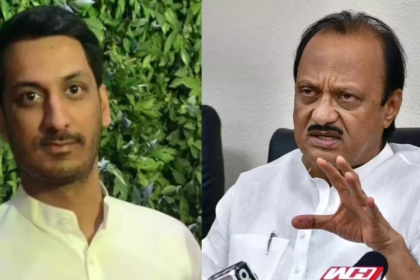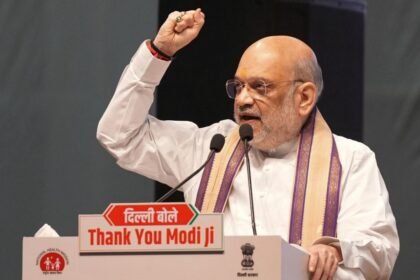Last Updated:
Leader of opposition in the Lok Sabha, Rahul Gandhi has released data alleging a vote theft of more than one lakh in Mahadevapura assembly of Bangalore Central Lok Sabha seat

LoP in the Lok Sabha and Congress leader Rahul Gandhi addresses a press conference at AICC HQ, in New Delhi on August 7. (Image: PTI/Salman Ali)
The standoff between the opposition and the Election Commission of India escalated on Thursday as Congress leader Rahul Gandhi released data alleging a vote theft of more than one lakh in the Mahadevapura assembly segment of the Bangalore Central Lok Sabha constituency.
In the 2024 Lok Sabha elections, incumbent MP PC Mohan of the BJP won the Bangalore Central seat for the fourth consecutive term. He secured 6,58,915 votes, only 32,707 more than the Congress candidate’s 6,26,208 votes. All four Lok Sabha seats within Bengaluru city limits – North, South, Central and Rural – are represented by the BJP.
“Congress research found over one lakh duplicate voters, invalid addresses, and bulk voters in Mahadevapura constituency in Karnataka,” Gandhi said during a press conference.
In his long presentation, Gandhi used the term “vote chori” (vote theft) to highlight that the seat had 11,965 duplicate voters, 40,009 voters with fake and invalid addresses, 10,452 bulk voters or single address voters, 4,132 voters with invalid photos and 33,692 voters misusing Form 6 meant for new voters.
हमने कर्नाटक की एक विधानसभा महादेवापुरा क्षेत्र की जांच की और पाया कि यहां 1,00,250 वोटों की चोरी की गई। पांच तरीकों से ये फर्जी वोट लिस्ट में जोड़े गए। ▪️11,965 डुप्लीकेट वोटर बनाए गए ▪️40,009 फर्जी पतों का इस्तेमाल हुआ ▪️10,452 वोटर बड़ी संख्या में एक ही पते पर रजिस्टर किए… pic.twitter.com/GZPA04cDd9— Priyanka Gandhi Vadra (@priyankagandhi) August 7, 2025
Soon after Gandhi’s allegations, BJP MP PC Mohan said his party did not win Mahadevapura through manipulation.
“We won because Hindus voted decisively against dynasty, appeasement, and entitlement. Rahul Gandhi must learn: minority-dominated constituencies are not Congress property. The voter is supreme. Accept the mandate,” he wrote on X.
Rahul Gandhi drops an “atom bomb” of allegations, but still can’t produce a single explosive proof. If 1,00,250 votes were stolen in Mahadevapura, why wasn’t a case filed in court within 45 days instead of holding a press conference one year later? This is just another drama. pic.twitter.com/eNyKv0fZRc— P C Mohan (@PCMohanMP) August 7, 2025
The Leader of Opposition in the Lok Sabha, Gandhi has made similar claims about Maharashtra and Haryana in recent months, especially after the Congress faced defeats in assembly polls held in these states last year.
In the last couple of elections, most opposition parties have questioned the electoral rolls. Interestingly, the Election Commission of India (ECI) has started a special intensive revision (SIR) in poll-bound Bihar so that it is ready to deal with such claims in future.
In June, too, in his article ‘Match-fixing Maharashtra’, Gandhi had demanded that the Election Commission (EC) should release voter rolls in machine-readable formats like CSV or Excel, so that parties can have automated comparison, validation, and auditing of electoral rolls. The poll body issues scanned PDF voter lists that lack consistent formatting, making automation difficult.
For one small assembly segment, he said it took six months for the Congress to collect “concrete evidence of vote chori”.
EC DEMANDS OATH
Following Gandhi’s “vote chori” allegations, several units of the EC asked him to provide details of irregularities in the voter list under oath, warning that providing “false evidence” is punishable under Section 227 of Bharatiya Nyaya Sanhita (BNS).
The chief electoral officers (CEO) of Karnataka, Maharashtra, and Haryana wrote to Gandhi highlighting that the Congress did not file any claim or appeal for the voter list published in these three states.
They reminded him, a Lok Sabha member since 2004, that poll results can only be questioned by way of election petition before the concerned high court.
“It is understood that during a press conference held today, you had mentioned about the inclusion of ineligible electors and exclusion of eligible electors in the electoral rolls… You are kindly requested to sign and return the enclosed declaration/oath under Rule 20(3)(b) of the Registration of Electors Rules, 1960, along with the name(s) of such elector(s) so that necessary proceedings can be initiated,” the three identical letters read.
Letter to Shri Rahul Gandhi, Hon’ble Member of Parliament and Hon’ble Leader of the Opposition in Lok SabhaExpecting the signed declaration and oath@ECISVEEP pic.twitter.com/7CLG100V2r— Chief Electoral Officer, Karnataka (@ceo_karnataka) August 7, 2025
Under the oath, Gandhi would say he is aware that making a false declaration in connection with electoral rolls is punishable under Section 31 of the Representation of the People Act, 1950.
“I also understand that giving false evidence is punishable under Sections 227 of the Bharatiya Nyaya Sanhita, 2023. I further declare that, although I am not/I am an elector of the said constituency, I have personal knowledge relevant to this case and am making this statement voluntarily,” the letters read.
The Uttar Pradesh CEO, meanwhile, fact-checked Gandhi’s allegations about two names registered in Karnataka and Uttar Pradesh, apart from other states. This name, Srivastava, was allegedly registered in four locations – Mumbai, Lucknow and two booths in Bengaluru. Another entity, Singh, had been claimed to be registered in two places in Bengaluru and in one booth in Varanasi.
In a statement in Hindi, the UP CEO said these two names were not registered in any part of Uttar Pradesh. In a series of posts on X, the EC also commented on various statements made by Gandhi.
“The statements made are misleading,” it said.
With Gandhi set to lead a public rally in Bengaluru on Friday (August 8) and the Karnataka CEO preparing to meet a Congress delegation the same day, the row is far from over. As the EC demands sworn declarations and rebuts allegations with data, the faceoff may evolve into a legal and political test case on the boundaries of electoral oversight, opposition scrutiny, and institutional accountability.

Nivedita Singh is a data journalist and covers the Election Commission, Indian Railways and Ministry of Road Transport and Highways. She has nearly seven years of experience in the news media. She tweets @nived…Read More
Nivedita Singh is a data journalist and covers the Election Commission, Indian Railways and Ministry of Road Transport and Highways. She has nearly seven years of experience in the news media. She tweets @nived… Read More
view comments
Read More







